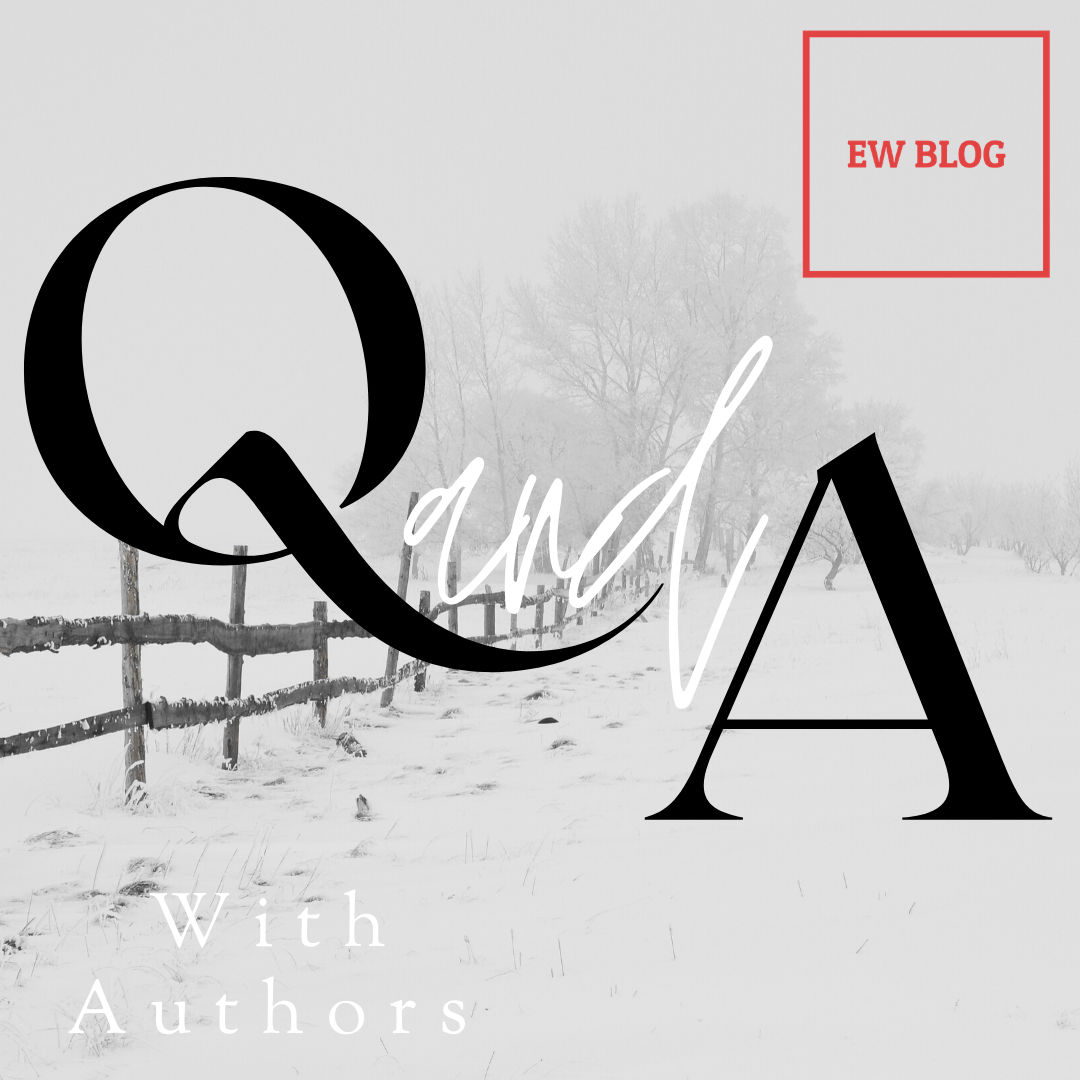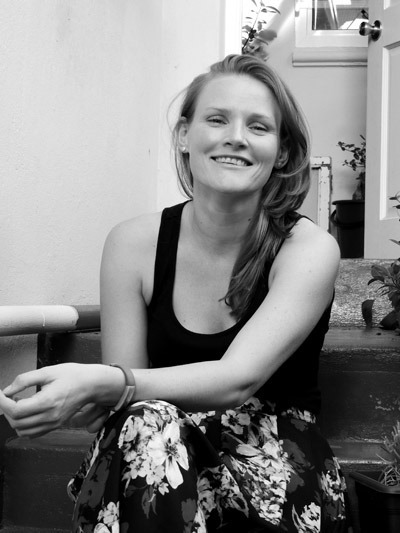

Q&A With Jen Thorpe
Author of The Fall

by Ezekiel Kekana
Jen Thorpe is a writer, researcher and a feminist. Jen has published three feminist essay collections and two novels. Her first novel, The Peculiars, was long-listed for the Sunday Times Fiction Prize and the Etisalat Fiction Prize. Jen’s latest novel is called The Fall released by Kwela Books. In this Q&A with EW Blog editor, Ezekiel Kekana, Jen reflects on writing The Fall, how the character of Thuli came about, her favourite local feminist writers, and a possible sequel of this riveting novel.

Question: Firstly, congratulations on your second book of 2020. For the benefit of our EW Blog readers, tell us who is Jen Thorpe- the writer?

Answer:
Jen Thorpe the writer began as Jen Thorpe the reader. I love the ability of fiction to show us things about the world and to reveal truth.
For a long time, I was a features journalism and opinion piece writer. I began writing online in 2010 for the Mail and Guardian-Thoughtleader, and have written articles and journalistic pieces on and off for the last decade. In 2012, I enrolled for a Masters in Creative Writing at the University of Cape Town where I began to focus more on creative fiction writing. That’s where I wrote The Peculiars (Penguin, 2016), which was longlisted for the Etisalat Prize for Fiction and the Barry Ronge Fiction Prize.
But, Jen Thorpe the writer has also always had a job as Jen Thorpe the feminist researcher. Writing doesn’t always pay the bills! I have worked for the last decade in the field of gender equality with a focus on gender-based violence. I’ve worked with NGOs, the South African Parliament, UNICEF, as a Commissioner at the Commission for Gender Equality, the World Bank, and others to try and address gender inequality in South Africa. This has also entailed a lot of writing but mostly in the form of research reports and policy briefs.

Question: Your latest book is called, The Fall, take us through the process of writing this book?

Answer:
Process is a good word! The Fall took about four years from the day I started it to the day it hit the shelves.
It began in 2016. I worked as a parliamentary researcher between 2013 and 2017, and during that time the #FeesMustFall protests happened around the country. I was at Parliament on the day that the students came to peacefully protest, and I witnessed how they were forcibly and violently removed. This was extremely traumatic to watch – not just for the violence at that time, but also for what it meant for our democracy.
Later in 2016, I was walking home from work and the voice of Thuli came into my mind, warning me that violence was still coming. I began writing her character as soon as I got home. In 2017 I was offered a place at the Vermont Studio Centre (VSC) writing residency in the USA. I applied for leave to attend this month long residency, but Parliament denied my application. So, I quit, finished up my job, and left the very next day to fly to the USA.
Thus, began the real and dedicated writing. I worked on The Fall at the VSC in March/April 2017, and then I was accepted to another residency in France, but I’d run out of funds. I crowdfunded to attend and invited people who had donated a certain amount to have a magical creature named after them. That’s where some of those creatures emerge. I also invited people on Facebook to come up with creatures, some of which appear in the book. In June and July 2017, I worked on it at the CAMAC Centre for the Arts (which sadly is no longer operating) for two dedicated months.
I wrote for most of 2017, working as a freelancer to pay the bills. Over this time, my sister Fiona read it chapter by chapter, like a serialised novel, and it was her supportive nagging me for more chapters that kept me going.
I submitted a draft to Kwela in 2018. Kwela came back to me and said they saw the potential, but it needed some work. So, I began attending local writing workshops with Rahla Xenopoulos, Maire Fischer and Chantal Stewart to work on characterisation.
I worked on it for another year, tweaking the characters, building up the magic, and planting seeds in the story that the reader would be able to follow through to the end. Finally, it was re-submitted in 2019, accepted, and only came out mid-2020 because of an already full publishing schedule.
So, a process it was, but I’m so grateful for the adventures it led me on.

Question: The title, The Fall, what inspired you to go with that title?

Answer:
Because the first character who came to me was Thuli I knew it would have to be set during the #FeesMustFall protests. But I realised that for each of the characters I was writing there was a Fall involved.
I began looking at things that we, in our ordinary language, describe as ‘a fall’. There are the easy ones that are immediately applicable to the SA situation. Falls from grace. Pride comes before a fall. Falling apart. Falling short.
But there were more complex ones that still also applied to our politics at that time, or to the character’s personal journeys in the text. To be riding for a fall is to act in a reckless way, which is what the character of our President in the story – Noné – was doing. To fall off the wagon is to start drinking again – which we know Helen is at risk of. To fall down a rabbit hole is to be found in a troubling or surreal situation – poor Adnan. To fall in love. To fall in line. To fall foul of is to come into conflict with. The word ‘fall’ originally came from Old Norse and was linked to the idea of original sin – to betray or fail in a way.
So, it seemed a perfect title to give to the book. It wasn’t only a book about #FeesMustFall but a book about what I thought was happening in power relations in our country, all of which involved some sort of fall.

Question: The Fall mirrors the events of the 2015 student-led movement, #FeesMustFall. With so many books written about the movement, what new message did you want to convey to the readers with this book?

Answer:
I think this is an important question that I’ve been thinking very hard about since 2016 when I started writing.
The Fall is set during the #FeesMustFall protests, but The Fall is not only about the protests. This is a fiction. I did not set out to write a book about the real and true events of what happened at the #FeesMustFall protests. That is a book that must be written by those that were there themselves.
But, the protests are used as a setting because they were part of an important political moment where the government and presidential narrative was starting to fall apart. A sort of ‘emperor has no clothes’ moment, and that is what I wanted to write about.
I wanted to write about the way that we in South Africa talk about protests, what they mean, who participates, how they should be policed. I wanted to write about the way we police the poor, and the way we treat and talk about police. I wanted to write about the way that our education system is unequal, and the way we ignore inequalities within those who are able to attend university. I wanted to write about what I had observed first hand as a parliamentary researcher – the way that politicians lie for each other with devastating events, a President that plundered our resources for personal pleasure and gain, about accountability, complicity, and injustice. I wanted to write about what happens when you love someone, and what you’ll do to protect them.
So, the new message that I want to convey, and I am certainly not the first person to ever have wanted to convey this, is to pay attention to the narratives we are told. To pay attention to power, who has it, and what it is used for.

Question: Thuli’s character is one that binds the story together throughout the book, take us through the process of building this character?

Answer:
Thuli arrived to me almost fully formed. This is something that, other writers will tell you, is like a jolt of energy in your body. She began talking to me on a walk home and when I sat down to write she poured out of my fingers as if I was taking dictation.
I knew she was going to be able to see the future, and that something terrible had caused this. I knew that she was going to see someone else get killed, and wanted to stop it, but was unwilling to stop it herself. So, there was conflict there – something to be unpicked. I knew she was in love, and that this was her driving desire – to protect the people she loved. Once you know those basic core elements of a character – what they want and what they will do to get it – you can pretty much know what they would do in any situation. So that’s how it went with Thuli too.

Question: Many reviewers have critiqued the book for having many characters, which they believe make it difficult for a reader to remember every character. Is there a specific reason why you decided to have many characters to carry the story?

Answer:
Have you noticed how when a significant political event happens – say the #FeesMustFall or #MeToo – everyone has a VERY STRONG opinion on it, straight away? But, we prioritise only certain types of voices, and repeat those over and over. I wanted it to be the case that in this story, you saw things from multiple perspectives and that each character got the same opportunity to tell you their perspective.
I tried to set myself the goal of writing seven characters over seven days – that was the experiment and what helped me to plot out the story as a writer. It obviously didn’t work out that way, with one entire character being removed, but it was an exercise that kept me writing and thinking about how I could shape the story.

Question: Like during the #FeesMustFall, sexual abuse is one of the themes which forms part in the book, as Thuli was violated by Mvusa, Sid, and Ntozimbi. Do you think, as a writer, Thuli was failed as the trio were not punished for their horrendous act?

Answer:
Absolutely. I think Thuli was failed by the university in the story, and by the justice system, and by Hector. That is the truth of sexual violence in South Africa – women are failed daily. Most women do not report rape. Of those that do report, only 4% of cases will end in a conviction. So Thuli’s story of violence is not unusual, and that is why it is devastating.

Question: While President Noné carries the hopes of many progressive South Africans, who would love to have a female President in South Africa one day. As a feminist writer, talk to us about the importance of having a female President, especially with regard to tackling issues of gender equality and dismantling structures that produce patriarchy and misogyny?

Answer:
A female leader will not necessarily act in the interests of advancing gender equality. We have seen this in our parliament, our cabinet, and our courts.
I would love to see an intersectional feminist president. The way our politics works now is that women have to be nominated by their parties and unless they nominate a feminist, we won’t see a woman president who does things differently.
Noné is a perfect example of this – she’s managed to get through the glass ceiling, but she’s still got a patriarchal hierarchical leadership style. She still has odd ideas about men and women. She’s a bully. This is not impossible to imagine when you look at the current set of politicians who could be our first female president.

Question: Should your readers expect a sequel of The Fall?

Answer:
I’m working on one!
But publishing is a business, so I hope people go out and buy the book, and that this encourages my publisher to give me a chance. Thank you to all the readers who have already bought the book. I’m very grateful.

Question: What is your message to young writers, particularly female writers, who would like to make writing a full-time profession?

Answer:
When I started writing I felt like I needed to get permission from someone to do it. I was, and still am, faced with an inner critic that says to me that nobody cares what I write and that it doesn’t matter. So, my advice to you is this:
- Read: Every book you read will teach you something about writing. Read local to keep the writing community in your area and country alive.
- Find someone who believes in your writing. A supporter and cheerleader. This person should be the first person you contact when you’re losing hope. Listen to them tell you that you can do this.
- Be grateful for criticism and feedback but learn which feedback to take seriously. There are going to be people who don’t like your writing. There are going to be people who don’t even give your writing a chance because they’ve decided that you are not the person who should be writing. There are going to be people who will criticise it because it needs criticism, and others who criticise it because they don’t get it, and others who criticise it because they want to break you down. BUT there are also going to be people who LOVE your writing. You need to think about whose feedback matters to you, and which feedback helps you improve as a writer.
- Take note of the weird and wonderful world we live in. Use your senses. Write a journal. One day this will all be interesting. Take interesting jobs. Take boring jobs and write about them.
- Find a writing community. Ideally this should be a community you feel able to share your work with, and who encourage you and hold you accountable to your dreams.
I don’t write full time, unfortunately that doesn’t make financial sense for me. I wish I could! So, a practical piece of advice would be to find a career that has a good leave allowance, or that is flexible enough so that you can fit writing into your life like a daily practice.

Question: If you were to invite three feminist writers to a seminar on gender-based violence in South Africa, who would that be and why them?

Answer:
Nechama Brodie – because I think she has good depth perception and an excellent bullshit filter for dodgy narratives around GBV.
Pumla Gqola – because she helped to reveal that rape is part of rape culture, not just acts committed by individuals.
Mona Eltahawy – because I think she is writing at the frontier of feminist rage and power.

Question:
Which book are you currently reading?

Answer:
I’m reading a few books at the moment.
1. Dawn Garisch – Eloquent Body. It explores the links between science and creativity and healing. It is absolutely wonderful.
2. Vicky Price – Women vs Capitalism. An assessment of why capitalism will not create gender equality and what to do about it.
3. Candice Chirwa (ed) – The Perils of Patriarchy. It’s a local collection of feminist essays. I love feminism.
I also just finished Yaa Gyasi Homecoming which was an incredible work of fiction and used form so powerfully. So, I’d definitely recommend that.
Book Review
Share this:
- Click to share on Twitter (Opens in new window)
- Click to share on Facebook (Opens in new window)
- Click to print (Opens in new window)
- Click to share on LinkedIn (Opens in new window)
- Click to share on Reddit (Opens in new window)
- Click to share on Tumblr (Opens in new window)
- Click to share on Pinterest (Opens in new window)
- Click to share on Telegram (Opens in new window)
- Click to share on WhatsApp (Opens in new window)
- Click to email a link to a friend (Opens in new window)

